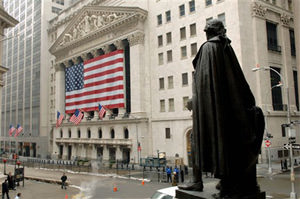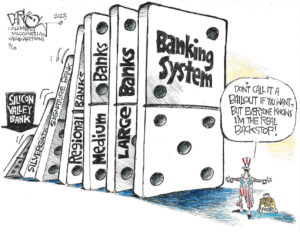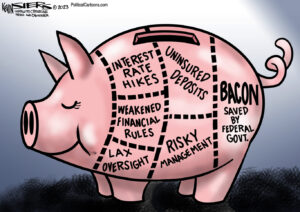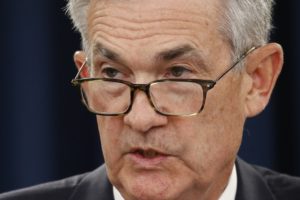Boston Tea Party, 2008
How dare you throw that tea into Boston Harbor! Such is the anti-democratic arrogance of the fear-mongering pundits and politicians who tell us if we taxpayers don’t instantly give the Wall Street banking bandits a $700-billion bailout, we are destroying America.
How dare you throw that tea into Boston Harbor! Such is the anti-democratic arrogance of the fear-mongering pundits and politicians who tell us if we taxpayers don’t instantly give the Wall Street banking bandits a $700-billion bailout, we are destroying America. Instead of applauding representatives from both parties who, for once, heeded the public rather than the fat cats, the established pundits blasted those who dared get out of line.
It was a time for some of the best commentators to fail and, as much as I hate to admit it, for Lou Dobbs, and even Newt Gingrich, to shine. Dobbs called it correctly: The sky is not falling, there is time for reasoned debate, and why isn’t the public being listened to? Gingrich put it best when he said short-circuiting serious congressional oversight over an enormous transfer of taxpayer dollars to an industry is “un-American.” Others, with whom I typically am in far greater agreement, just rolled over to give the bankers what they demanded.
“When Madmen Reign” was the headline on a column by Bob Herbert in The New York Times that absolves the Democrats from any responsibility for the crisis despite a willingness of their party’s leadership in the past to vote for key legislation proposed by what Herbert condemns as the “anti-regulation, free market zealots” of the Republican Party. Both parties betrayed the principles of a true free market—remember Adam Smith’s invisible hand, under which no market player could unilaterally set price?—in favor of the concentrated power of oligopoly to control everything.
Those Republicans who dared to vote, this time, against the demands of the Wall Street power brokers were derided by New York Times conservative columnist David Brooks as engaging in the “Revolt of the Nihilists.” While suddenly embracing President Franklin Roosevelt’s New Deal as the positive alternative to nihilistic behavior, Brooks ignored Roosevelt’s main achievement, which was to put the public interest before that of the Wall Street titans.
Wasn’t it nihilistic when Congress, led by Republicans but supported by key Democrats, including then-President Bill Clinton, shredded the protections put into place by Roosevelt to control an ever-avaricious banking industry?
Anyone who has bothered to study that history knows that Sen. John McCain was deeply involved in the push for rampant deregulation, and his choice of former Senate Banking Committee Chairman Phil Gramm, the principal author of the decisive deregulation legislation, to co-chair the McCain presidential campaign mocks McCain’s attempt to blame the crisis on everyone but himself.
The Democrats, however, also are culpable, and it was sickening to watch Clinton on “The Daily Show” getting away with blaming a crisis he helped create on overexcited home purchasers. I don’t blame “Daily Show” host Jon Stewart for not knowing enough about the subject to challenge Clinton on his own fervent support of deregulation, but it is disappointing that Paul Krugman, an economist and one of the nation’s sharpest commentators, should also miss that point. Indeed, in his column for The New York Times castigating McCain for his connection to Gramm, Krugman said voters should be reassured that Barack Obama has Clinton’s treasury secretary, Robert Rubin, to turn to for advice on how to handle this mess.
Rubin, the former head of Goldman Sachs, worked as hard as Gramm to pass the legislation his Wall Street buddies wanted. Rubin then returned to Wall Street as a honcho at Citigroup, the first company to successfully exploit the new legislation’s nefarious loopholes. As for his insight, it was as recently as January of this year that Rubin termed the financial meltdown a normal phase of the business cycle.
Back in the spring, two months after Rubin’s “what, me worry?” silliness on the economy, Obama gave a brilliant speech on Wall Street’s problems at the same venue, Manhattan’s Cooper Union for the Advancement of Science and Art, in which he singled out as central to the problem the legislation that Rubin had gotten Clinton to sign.
Obama should stick with the wisdom of a community organizer from the tough side of Chicago: Fight the bankers who swindle unsuspecting homeowners, and restore the bailout provision that Democratic leaders had proposed but then abandoned—stopping the home foreclosures by empowering bankruptcy court judges to force a renegotiation of terms.
Any bailout worthy of support should put endangered homeowners first, not the bankers who swindled them.
Robert Scheer is the editor in chief of Truthdig and author of a new book, “The Pornography of Power: How Defense Hawks Hijacked 9/11 and Weakened America.”
Your support matters…Independent journalism is under threat and overshadowed by heavily funded mainstream media.
You can help level the playing field. Become a member.
Your tax-deductible contribution keeps us digging beneath the headlines to give you thought-provoking, investigative reporting and analysis that unearths what's really happening- without compromise.
Give today to support our courageous, independent journalists.






You need to be a supporter to comment.
There are currently no responses to this article.
Be the first to respond.